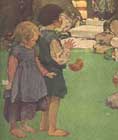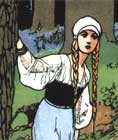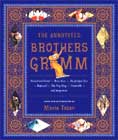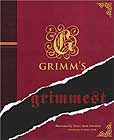


Author's Notes
translated by Margaret Hunt
Return
to
Household Tales:
Table of Contents
SurLaLune Fairy Tales Main Page
Poverty
and Humility Lead to Heaven
THERE was once a King's son who went
out into the world, and he was full of thought and sad. He looked at the
sky, which was so beautifully pure and blue, then he sighed, and said,
"How well must all be with one up there in heaven!" Then he
saw a poor gray-haired man who was coming along the road towards him,
and he spoke to him, and asked, "How can I get to heaven?" The
man answered, "By poverty and humility. Put on my ragged clothes,
wander about the world for seven years, and get to know what misery is,
take no money, but if thou art hungry ask compassionate hearts for a bit
of bread; in this way thou wilt reach heaven."
Then the King's son took off his magnificent coat, and wore in its place the beggar's garment, went out into the wide world, and suffered great misery. He took nothing but a little food, said nothing, but prayed to the Lord to take him into his heaven. When the seven years were over, he returned to his father's palace, but no one recognized him. He said to the servants, "Go and tell my parents that I have come back again." But the servants did not believe it, and laughed and left him standing there. Then said he, "Go and tell it to my brothers that they may come down, for I should so like to see them again." The servants would not do that either, but at last one of them went, and told it to the King's children, but these did not believe it, and did not trouble themselves about it. Then he wrote a letter to his mother, and described to her all his misery, but he did not say that he was her son. So, out of pity, the Queen had a place under the stairs assigned to him, and food taken to him daily by two servants. But one of them was ill-natured and said, "Why should the beggar have the good food?" and kept it for himself, or gave it to the dogs, and took the weak, wasted-away beggar nothing but water; the other, however, was honest, and took the beggar what was sent to him. It was little, but he could live on it for a while, and all the time he was quite patient, but he grew continually weaker. As, however, his illness increased, he desired to receive the last sacrament. When the host was being elevated down below, all the bells in the town and neighbourhood began to ring. After mass the priest went to the poor man under the stairs, and there he lay dead. In one hand he had a rose, in the other a lily, and beside him was a paper in which was written his history.
When he was buried, a rose grew on one side of his grave,
and a lily on the other.
Grimm, Jacob and Wilhelm. Household Tales. Margaret Hunt, translator. London: George Bell, 1884, 1892. 2 volumes.
Notes
Coming soon...
©Heidi
Anne Heiner, SurLaLune Fairy Tales
E-mail: surlalune@aol.com
Page last updated October 15, 2006
www.surlalunefairytales.com





